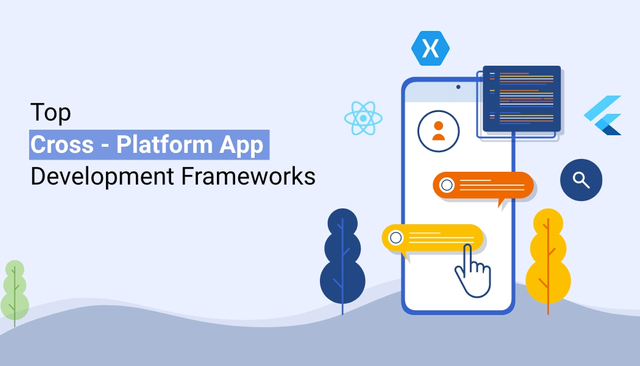As the demand for mobile apps is increasing, the scope of cross-platform app development is also expanding. Businesses and developers today look for efficient and feature-rich technologies to build high-performance cross-platform apps. Therefore, the popularity of cross-platform app development frameworks is increasing a lot.

There are several frameworks that allow the creation of cross-platform apps for Android and iOS. However, many developers and app creators sometimes face difficulty in choosing the best framework for developing cross-platform apps.
If you also have confusion about selecting the right framework, then here, we have listed the top cross-platform app development frameworks which you can use to build mobile apps for all mobile OS platforms.
What is meant by a cross-platform app development framework?
There are two types of mobile apps-native and cross-platform. Native apps are built solely for one operating system. They only use native app development frameworks and other SDKs. For instance, a native Android app would perform only on the Android platform.
Whereas, cross-platform is meant to run across all mobile operating systems. A cross-platform app development framework allows developers to write a single codebase and deploy it to every OS platform. As a result, a cross-platform app could perform on Android, iOS, and other mobile OS platforms.
Best Cross-Platform App Development Frameworks
There are many tools and SDKs for creating multi-platform mobile apps. However, some frameworks provide better features and resources for developing high-end features and give the same native-like feel in cross-platform apps. Below are those cross-platform app development frameworks which are widely used by developers and mobile app development companies across the entire globe.
1. React Native
React Native is Meta's open-source UI development framework. It was released in 2015. It is a JavaScript library that provides many in-built widgets and UI components. React Native is a powerful cross-platform development technology because it has advanced and complex-level development features like Hot Reload. Developers can use this framework to build various mobile apps for all industry niches. Mobile apps built with React Native perform seamlessly across all platforms including Android and iOS. React Native apps give the same feel as native apps. Therefore, it is counted among the top cross-platform app development frameworks in the mobile app development industry.
2. Flutter
Flutter is a UI SDK owned by Google. It is relatively new in the market and launched in 2017. Flutter SDK provides rich support for developing cross-platform mobile apps. It also allows developers to create applications for web and desktop platforms. With Flutter, developers need to write a single codebase and deploy it on every OS platform. This framework uses Dart as its programming language which is new for many developers. Hence, the Flutter developer community is evolving gradually. Despite this, Flutter's extensive support for cross-platform app development is considered one of the leading frameworks in the developer community.
3. Kotlin
Kotlin is also one of the popular cross-platform app development frameworks. It was developed by JetBrains for building apps for Android and iOS. Kotlin allows to share same code between the two platforms and creates platform-specific code when it is required. The best part which makes Kotlin a bit different from other frameworks is that it also helps in developing native apps. Android Studio supports native app development with Java and Kotlin programming languages. Kotlin gives developers full access to its user interface. They can use the latest UI frameworks like Jetpack Compose and Swift UI for creating additional features.
To Wrap Up
Cross-platform app development is a highly useful technology. It empowers developers with advanced and extended features for developing high-performance mobile apps for all OS platforms. When choosing the best cross-platform app development framework, you should select it as per your project requirements. It is because every framework has its own pros and cons. Hence, what suits your app development needs is the best framework.